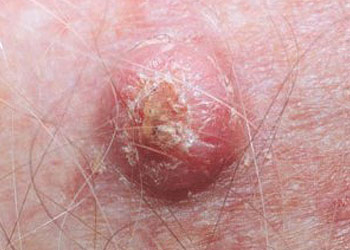
Squamous Cell Carcinoma (SCC), is the second most common type of skin cancer. They arise from squamous cells which are located towards the top of the outermost layer of the skin (epidermis).
These skin cancers often develop on the head, neck, forearms , hands and are usually the result of long exposure to ultraviolet (UV) light. If left untreated, SCC will continue to grow and develop the potential to spread to the lymph glands and internally to other parts of the body, and could eventually lead to death.
What causes Squamous Cell Carcinoma?
The most important cause of SCC is chronic exposure to sunlight. About 80% of these skin cancers occur in sun exposed areas of the skin. The remaining may occur in areas which are not usually exposed to sunlight (such as the genitals).
Solariums and tanning beds increases risk of SCC development by 2.5 times. Other rarer causes include chronic infections or skin inflammation.
Am I at risk of developing Squamous Cell Carcinoma?
Anyone who has had frequent sun exposure can develop SCC. These skin cancers usually arise from sun exposure over time, so outdoor workers who spend long hours in the sun are at very high risk in Australia.
Genetic factors may also increase risk of developing squamous cell carcinoma. People with a fair complexion, light coloured hair and burn easily are particularly prone.
Another high-risk group for SCC development are people with a weakened immune system, such as after a kidney or organ transplant or some cancers of the lymph or blood cells.
Treatment
SCC’s can be treated with topical therapy, laser, surgery, cryotherapy, radiation, and photodynamic therapy (PDT).
All treatments are based on the type, size, location, and depth of penetration of the tumour, as well as the patient’s age and general health.
